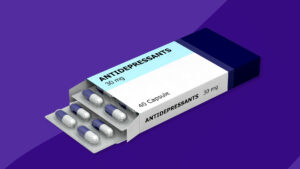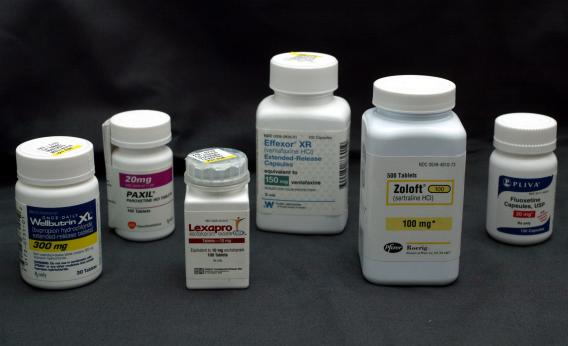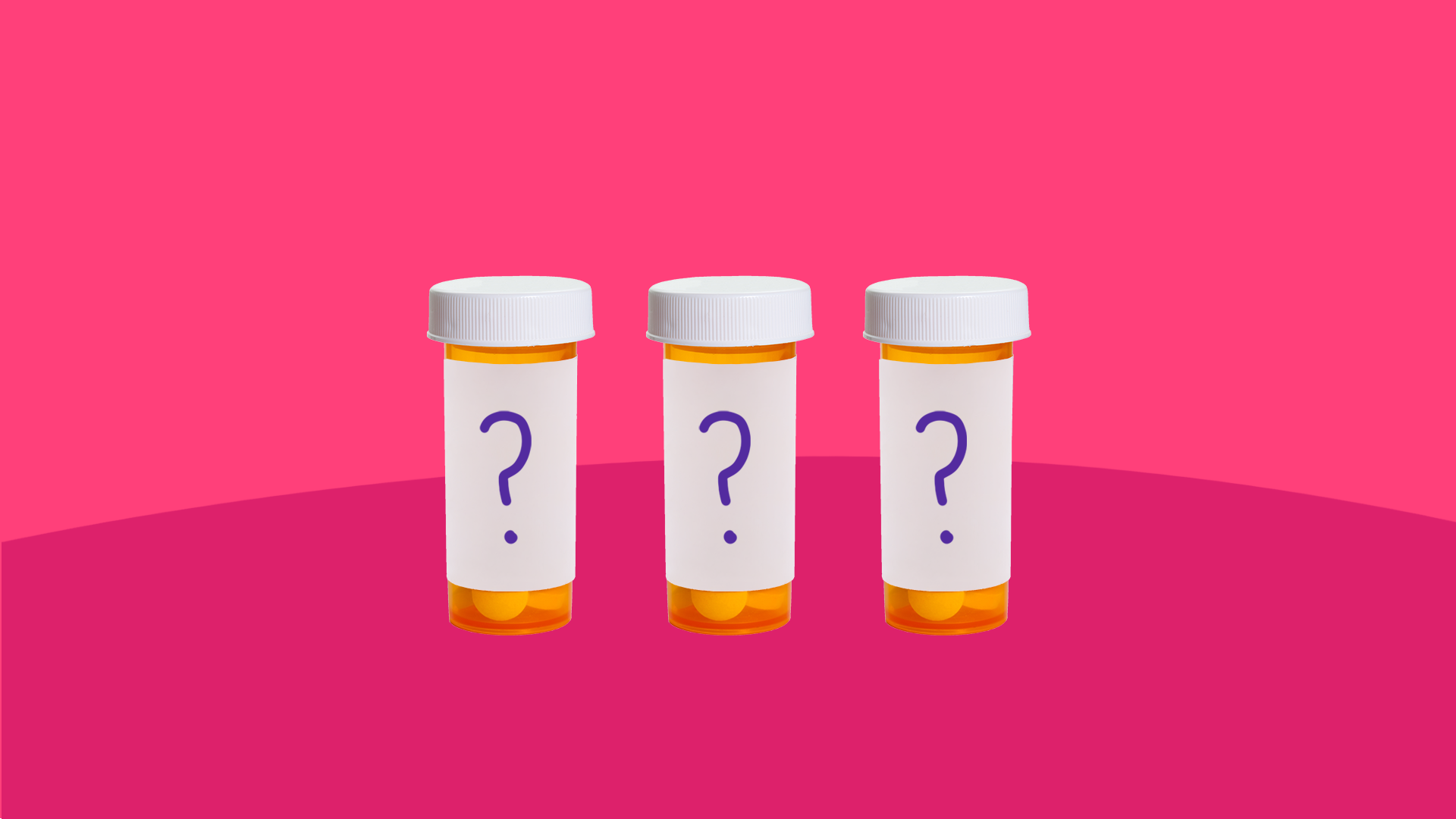There are many different types of antidepressants on the market, and it can be challenging to decide which one is right for you. Each antidepressant has a unique set of side effects and benefits, so it is important to know what each one does before making a decision. This blog post will discuss the different types of antidepressants and what they do. We will also provide information on how to find the right antidepressant for you.
Contents
What Are Antidepressants?
 A class of drugs that are used to treat depression by increasing levels of neurotransmitters in the brain. The usage of antidepressants has increased significantly in the past two decades. According to the National Center for Health Statistics, the percentage of people taking antidepressants grew from 0.33% in 1988-1994 to 0.58% in 1999-2000 (Eaton, 2007). Despite their widespread use, there is still much debate surrounding their efficacy and safety. This article will review some of the most common types of antidepressants and their potential side effects.
A class of drugs that are used to treat depression by increasing levels of neurotransmitters in the brain. The usage of antidepressants has increased significantly in the past two decades. According to the National Center for Health Statistics, the percentage of people taking antidepressants grew from 0.33% in 1988-1994 to 0.58% in 1999-2000 (Eaton, 2007). Despite their widespread use, there is still much debate surrounding their efficacy and safety. This article will review some of the most common types of antidepressants and their potential side effects.
People with depression often have low levels of neurotransmitters, such as serotonin and norepinephrine. Antidepressants work by increasing the levels of these neurotransmitters in the brain. This can help to improve mood and relieve symptoms of depression.
There are many different types of antidepressants available, and they can be classified into several different categories. The most common types are selective serotonin reuptake inhibitors (SSRIs), tricyclic antidepressants (TCAs), monoamine oxidase inhibitors (MAOIs), and atypical antidepressants.
There are many benefits of taking antidepressants. They can help to improve mood, relieve symptoms of depression, and increase energy levels. Antidepressants can also help to improve sleep quality and reduce anxiety. However, there are also some potential side effects associated with taking antidepressants. These include nausea, weight gain, sexual dysfunction, dry mouth, and fatigue.
If you are considering taking antidepressants, it is important to discuss the risks and benefits with your doctor. Antidepressants are not right for everyone, and they can have serious side effects. Be sure to talk to your doctor about all of the potential risks and benefits before starting any medication.
Different Types of Antidepressants
There are many different types of antidepressants, which work in different ways. Some common types of antidepressants include:
SSRIs (Selective Serotonin Reuptake Inhibitors)
 SSRIs are the most commonly prescribed type of antidepressant. They work by increasing levels of serotonin in the brain. SSRIs are generally considered to be safe and effective, with few side effects. Common SSRIs include:
SSRIs are the most commonly prescribed type of antidepressant. They work by increasing levels of serotonin in the brain. SSRIs are generally considered to be safe and effective, with few side effects. Common SSRIs include:
Fluoxetine (Prozac)
Fluoxetine is a highly effective SSRI. It is approved for the treatment of the major depressive disorder, obsessive-compulsive disorder, panic disorder, and bulimia nervosa. Fluoxetine may cause some side effects, such as nausea, insomnia, and sexual dysfunction. This medication was in the news recently when it was revealed that the shooter in the Parkland, Florida school shooting was taking fluoxetine.
Sertraline (Zoloft)
Sertraline is a type of antidepressant that is classified as a selective serotonin reuptake inhibitor (SSRI). SSRIs work by increasing levels of serotonin in the brain. Serotonin is a neurotransmitter or chemical messenger, that plays a role in mood and emotions. Sertraline is used to treat major depressive disorder, obsessive-compulsive disorder (OCD), panic disorder, post-traumatic stress disorder (PTSD), social anxiety disorder, and premenstrual dysphoric disorder.
Paroxetine (Paxil)
Paroxetine is a serotonin reuptake inhibitor (SSRI) antidepressant. It works by increasing levels of serotonin in the brain. Serotonin is a natural substance that helps maintain mental balance. The history of this drug began in 1992. This was the first SSRI to be approved by the FDA for the treatment of depression. Common side effects include nausea, vomiting, diarrhea, constipation, headache, drowsiness, trouble sleeping (insomnia), and sexual problems (decreased sex drive and difficulties with orgasm).
Paroxetine is available as a generic drug and as the brand-name drugs Paxil, Paxil CR, and Pexeva. Brand names: Paxil, Paxil CR, Pexeva . . .
This is one of the most commonly prescribed SSRIs. It’s approved to treat the major depressive disorder in adults and children who are at least 12 years old. Doctors may also prescribe it to people with panic disorder, post-traumatic stress disorder
Citalopram is usually well-tolerated, but some common side effects include diarrhea, dry mouth, fatigue, headache, increased sweating, insomnia, nausea, and sexual problems. These side effects typically go away with time. If they persist or become bothersome
You should talk to your doctor about any potential risks before starting citalopram or any other antidepressant. For example, this drug can interact with other medications and may cause serious side effects.
Dapoxetine
Dapoxetine (Priligy) is a short-acting SSRI. It is used to treat premature ejaculation in men. Daemonorops is an herbal remedy used to treat anxiety and depression. It is thought to work by increasing levels of serotonin in the brain. Also, this medication is used to treat anxiety and depression. The working of this medication is not known exactly. It may work by restoring the balance of certain natural substances in the brain.
Serotonin-noradrenaline reuptake inhibitors (SNRIs)

Another type of antidepressant is the serotonin-norepinephrine reuptake inhibitor (SNRI). These types of drugs work by increasing levels of both serotonin and norepinephrine. SNRIs are often used to treat depression that has not been helped by other types of antidepressants.
The history of SNRIs began in the 1970s when researchers were looking for a new way to treat depression. They found that some drugs could increase levels of both serotonin and norepinephrine. These drugs were called dual reuptake inhibitors.
The first SNRI was introduced in 1993. It was called venlafaxine (Effexor). Since then, other SNRIs have been developed, including duloxetine (Cymbalta) and desvenlafaxine (Pristiq).
SNRIs are generally well tolerated. The most common side effects include dry mouth, dizziness, headache, nausea, and fatigue. Some people may also experience an increase in blood pressure when they take SNRIs.
If you are considering an SNRI, it is important to talk to your doctor about the potential risks and benefits. SNRIs may not be right for everyone.
Tricyclic Antidepressants
 Another type of antidepressant is a tricyclic antidepressant. This type of antidepressant affects chemicals in the brain that may become unbalanced. Tricyclics are older than SSRIs and tend to be less expensive. They’re also generally more likely to cause side effects, such as dry mouth, constipation, weight gain, and drowsiness. Examples of tricyclic antidepressants include:
Another type of antidepressant is a tricyclic antidepressant. This type of antidepressant affects chemicals in the brain that may become unbalanced. Tricyclics are older than SSRIs and tend to be less expensive. They’re also generally more likely to cause side effects, such as dry mouth, constipation, weight gain, and drowsiness. Examples of tricyclic antidepressants include:
TCAs were once a go-to treatment for depression but have largely been replaced by newer drugs with fewer side effects. That said, they may be an effective option if other treatments haven’t worked or if you can’t tolerate the side effects of other medications. People use this type of antidepressant for other conditions as well. The working of this type of antidepressant is not very well understood.
Monoamine oxidase inhibitors (MAOIs)
 This class of antidepressants works by inhibiting the monoamine oxidase enzyme. Monoamine oxidase is responsible for breaking down neurotransmitters such as serotonin and norepinephrine. MAOIs are effective but tend to be used as a last resort because they can cause serious and even life-threatening side effects when taken with certain other medications or foods. These drugs can also cause high blood pressure.
This class of antidepressants works by inhibiting the monoamine oxidase enzyme. Monoamine oxidase is responsible for breaking down neurotransmitters such as serotonin and norepinephrine. MAOIs are effective but tend to be used as a last resort because they can cause serious and even life-threatening side effects when taken with certain other medications or foods. These drugs can also cause high blood pressure.
Examples of MAOIs include:
Phenelzine (Nardil)
Phenelzine is one of the MAOIs that are available and it works by inhibiting the monoamine oxidase enzyme. This enzyme is responsible for breaking down neurotransmitters such as serotonin and norepinephrine. MAOIs are effective but tend to be used as a last resort because they can cause serious and even life-threatening side effects when taken with certain other medications or foods. These drugs can also cause high blood pressure.
Isocarboxazid (Marplan)
Isoxazolidines are a class of antidepressants that includes isocarboxazid (Marplan). These drugs are thought to work by inhibiting the reuptake of norepinephrine and serotonin in the brain.
Isoxazolidines are generally considered to be more effective than other classes of antidepressants, but they also have a higher risk of side effects. Side effects may include dry mouth, constipation, weight gain, and sexual dysfunction. Isocarboxazid is usually taken once or twice daily. It should not be taken with MAO inhibitors or SSRIs. If you miss a dose, take it as soon as possible. If it is almost time for your next dose, skip the missed dose and continue with your regular dosing schedule.
Serotonin antagonists and reuptake inhibitors

The most common types of antidepressants are serotonin antagonists and reuptake inhibitors (SARIs), which increase the level of serotonin in your brain. Serotonin is a neurotransmitter that plays an important role in mood and emotional regulation.
Serotonin antagonists and reuptake inhibitors are often prescribed as first-line treatments for depression because they’re generally well-tolerated and have fewer side effects than other types of antidepressants. These medications can be taken in pill form or as injections, and they work by blocking the reabsorption of serotonin into nerve cells.
Noradrenaline and Specific Serotonergic Antidepressants
Noradrenaline and specific serotonergic antidepressants (NASSAs) are newer types of antidepressants. They work by inhibiting the reuptake of noradrenaline and serotonin. This increases the levels of these chemicals in your brain, which helps to improve your mood. These anti-depressants are thought to be more effective than SSRIs in treating anxiety and depression that are resistant to treatment.
NSSA may cause fewer side effects than other types of antidepressants, but it can still cause dry mouth, insomnia, headache, and fatigue. These side effects are usually mild and go away after a few weeks. If you experience any severe side effects, such as an increase in suicidal thoughts or behaviors, you should contact your doctor immediately.
The history of NSSA began in the 1950s with the development of tricyclic antidepressants (TCAs). These were the first type of antidepressants to be developed and are still used today. TCAs work by inhibiting the reuptake of noradrenaline and serotonin, which increases the levels of these chemicals in your brain.
Benefits of Types of Antidepressants

There are many benefits to taking antidepressants. Some of these benefits of different types o antidepressants include:
Helps To Improve Moods
One of the main benefits of taking antidepressants is that they help to improve your mood. If you are feeling down, or have been diagnosed with depression, then taking an antidepressant can help to improve your mood and make you feel better.
Can Help To Reduce Anxiety
Another benefit of taking antidepressant medication is that it can help to reduce anxiety. If you suffer from anxiety, then taking an antidepressant can help to ease your symptoms and make you feel more relaxed.
Can Help To Treat Insomnia
If you suffer from insomnia, then taking an antidepressant can help to treat your condition. Antidepressants can help to improve sleep quality and make it easier for you to fall asleep and stay asleep.
Makes It Easier To Concentrate
If you have difficulty concentrating, then taking an antidepressant can help to improve your concentration. Antidepressants can help to increase levels of neurotransmitters in the brain, which can improve cognitive function and make it easier for you to focus.
Can Help To Reduce Pain
If you suffer from chronic pain, then taking an antidepressant can help to reduce your pain. Antidepressants work by reducing inflammation and pain signals in the brain, which can help to ease your symptoms.
Improves Energy Levels
One of the benefits of taking antidepressants is that they can help to improve your energy levels. If you suffer from fatigue or low energy levels, then taking an antidepressant can help to give you a boost of energy and improve your overall well-being.
Reduces Risk Of Suicide
Antidepressants can also help to reduce the risk of suicide. If you are feeling suicidal, then taking an antidepressant can help to ease your symptoms and make you feel better. Antidepressants can also help to prevent suicide by making it easier for you to get help if you are feeling suicidal.
How To Choose From Different Types of Antidepressants?

Choosing a type of antidepressant can feel daunting. There are many different types and brands, all with their unique side effects. It’s important to work with your doctor to figure out which medication is right for you. Here are some things to keep in mind when choosing a type of antidepressant:
Your Symptoms
One of the main things to consider when choosing an antidepressant is the severity and types of symptoms you’re experiencing. If you have mild depression, your doctor may prescribe a different medication than if you have severe depression. Antidepressants can also be used to treat other conditions such as anxiety, so it’s important to be clear about all of the symptoms you’re experiencing.
Your Medical History
Your medical history will also play a role in what type of antidepressant your doctor prescribes. If you have a history of heart disease, for example, your doctor may avoid prescribing a tricyclic antidepressant, which can cause heart problems. Other medical conditions such as pregnancy or breastfeeding may also limit the types of antidepressants that are safe for you to take.
Your Other Medications
If you’re taking other medications, that will also influence which antidepressant your doctor prescribes. Some antidepressants can interact with other medications, so it’s important to let your doctor know about everything you’re taking. This includes over-the-counter medications, vitamins, and supplements.
Your Personal Preferences
There are many different types of antidepressants available, so it’s important to consider your personal preferences when choosing one. For example, some people prefer not to take a medication that causes weight gain or sexual side effects. Others may want an antidepressant that doesn’t require daily dosing or has fewer side effects. Be sure to discuss your preferences with your doctor.
Tips To Keep In Mind While Using Types of Antidepressants

Using an antidepressant is a decision that you and your doctor will make together. Many factors go into this decision including the severity of your depression, other medical conditions you may have, and other medications you are taking. Here are some things to keep in mind while using antidepressants.
- Anti-depressants are not one-size-fits. What works for one person may not work for another. It is important to talk to your doctor about the different types of antidepressants and what they each do.
- You may need to try more than one type of antidepressant before finding the right one for you. Do not get discouraged if the first medication you try does not work. It can take time to find the right medication and dosage for you.
- You can’t just stop taking antidepressants. If you want to stop taking your medication, it is important to talk to your doctor first. Stopping suddenly can cause withdrawal symptoms.
- Try to eat good foods, exercise, and get enough sleep while taking antidepressants. These things can help improve your mood and make the medication work better.
- Consult a doctor if you have any concerns about taking antidepressants. They can answer any questions you may have and help you make the best decision for your health
These are some of the tips for using types of antidepressants. Do not forget to consult your doctor for more tips.
Conclusion
An antidepressant may be the right treatment option for you if you’re experiencing moderate to severe depression. Talk to your doctor about which type of antidepressant may work best for you based on your symptoms and medical history. With time and patience, you may find the perfect fit for your needs.
There are many different types of antidepressants available, so it’s important to work with your doctor to find the one that’s best for you. Don’t get discouraged if the first medication doesn’t work—it often takes trial and error to find the right one. Be patient and stay positive—the right treatment is out there for you. If you or someone you know is in a crisis, contact us.
Hope this article was of help to you! If you are suffering from mental health disorders, you may seek help from Therapy Mantra. We have a team of highly trained and experienced therapists who can provide you with the tools and skills necessary for overcoming mental health issues. Contact us today to schedule an online therapy or download our free Android or iOS app for more information.


